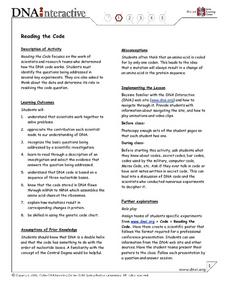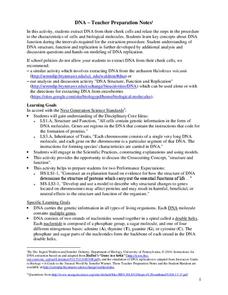Virginia Department of Education
Genetic Variation and Mutations
Young scientists demonstrate their creativity while completing several activities, to assess genetic variations and mutations. Instructors provide a list of options and scientists choose to write a comic strip, create a book,...
Curated OER
DNA Code
Students synthesize information gathered from the web on reading the DNA code. In this upper-level biology lesson plan, students use an online resource to gain information about DNA codes and then create posters on what they have...
Curated OER
Genetic Jewels: Building the DNA Model
Students construct segments of DNA to create a piece of jewelry. In this genetics lesson students create a DNA sequence that they turn into something to wear.
Curated OER
Nucleic Acids and Protein Synthesis
Learners cut out the nucleotide models and have an opportunity to relax and chat. Using imagination, students pretend to be molecules acting out protein synthesis and whole body movement.
Curated OER
Teacher Preparation Notes on Genetics
Students explore genetics through various hands-on activities. In this biology activity, students predict the probability of offspring genotypes and phenotypes using the Punnett Square. They explain the causes of genetic abnormalities.
Curated OER
Who Stole My Salad?
Eighth graders explain how protein is made in the cell. In this biology lesson, 8th graders translate RNA and DNA using an internet database. They determine the thief based on evidence collected.
Curated OER
The Watson-Crick Model of DNA Structure
Junior geneticists construct models of DNA to discover sequencing and pairing of nucleotides. They use the models to simulate protein synthesis and then translate the codes into physical traits. Finally, they use the traits to create a...
Curated OER
Extracting DNA from Your Cells - Teacher Preparation Notes
Students extract their own DNA from cheek cells. In this biology instructional activity, students explain the replication process. They identify the structure and composition of DNA.
Curated OER
The Spanish Omelet
High schoolers use analogies to show the relationships among cell, nucleus, genes, chromosome, ribosome, replication, mitosis, transcription, translation, DNA, RNA, amino acids and proteins, genotype, phenotype, and genetics vs....
Curated OER
Hierarchical Organization in Biology: Students Presentations of Neurobiology
Students gather (research) information on neuron structure and action potential. Students are guided to make inferences about the synapse and its relationship to neurotransmitter release and action. They are also guided to make...
Curated OER
Animals and Humans Say the Darnedest Things
Students explore and analyze human and animal communications and create a short film that illustrates their findings.
Curated OER
Using Blood Tests to Identify Babies and Criminals
Students solve a crime by matching a suspect's blood type to physical evidence collected at the crime scene. In this forensic science lesson, students identify the different blood types. They explain how blood tests work.
Curated OER
Cells and Cancer
Students idenitfy that cancer is a growth of mutated cells and that cancer cells are only one type of cell that causes disease in our body. They also identify that all eukaryotic cells contain a nucleus, cytoskeleton, and a cell...














